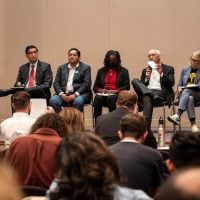Deadline: 10-May-21
The USAID/West Africa SERVIR 2 activity serves to increase the ability of local, national, and regional institutions to apply geospatial technologies and analysis to improve decision making and management of resources to improve the resilience of countries in the region, mitigate the impacts of climate change, and ensure appropriate land use to reduce greenhouse gas emissions. It is a five-year activity working in West Africa, primarily in Burkina Faso, Niger, Ghana, Senegal, Mali, and Nigeria.
SERVIR, a joint development initiative of the National Aeronautics and Space Administration (NASA) and the United State Agency for International Development (USAID), works in partnership with leading regional organizations world-wide to help developing countries use information provided by Earth observing satellites and geospatial technologies for managing climate risks and land use.
Decision-makers are empowered with tools, products, and services to act locally on climate-sensitive issues such as disasters, agriculture, water, ecosystems, and land use. SERVIR is improving awareness, increasing access to information, and supporting analysis to help people in West Africa, Eastern and Southern Africa, Hindu Kush Himalaya, the Lower Mekong, and South America manage challenges in the areas of food security, water resources, land use change, and natural disasters.
Objectives
The goal of the USAID SERVIR WA 2 activity is to increase the ability of local, national, and regional institutions to apply geospatial technologies and analysis to improve decision making and management of resources to improve the resilience of countries in the region, mitigate the impacts of climate change, and ensure appropriate land use to reduce greenhouse gas emissions.
Development decisions based on accurate data and information across West Africa can help to achieve more resilient outcomes in agriculture, coastal zone management, disaster risk management, water resources management, and land use. Timely Earth Observation (EO) data, maps, and predictive models can be effective tools for filling data gaps, visualizing change, understanding and managing risk, performing analysis, and considering future scenarios. The SERVIR WA 2 activity will focus on supporting the SERVIR WA hub to achieve the following objectives:
- Build the capacity of analysts and decision makers in government, civil society groups, and the media to integrate geospatial data, including climate data, and technologies into their analysis, operational systems, policy, planning, management, and communications;
- Raise awareness of and increase access to geospatial data and information by improving management and access to existing and new data and information at national and regional levels; and
- Create user-tailored geospatial services (such as decision support tools, applications, models, dissemination, and training) to get information to the people who need it to address priority development issues, in collaboration with NASA and other international scientists.
SERVIR thematic Areas
SERVIR WA phase one focused on four thematic areas:
- food security and agriculture;
- water and hydroclimatic disasters;
- land cover and land use change and ecosystems; and
- weather and climate.
These four service areas are likely to be similar for SERVIR WA 2 but are not limited to those listed. If additional high impact priority service areas are identified during the needs assessment, any expansion or change to the service areas will be reflected in a modification to the award.
Funding Information
- Subject to funding availability, USAID intends to provide between $12 million to $15 million in USAID funding contribution for one cooperative agreement per 2 CFR §200.24, and ADS 303.3.11 and 304.3.3, respectively, in response to this NOFO.
- The anticipated cooperative agreement period of performance spans five years.
Eligibility Criteria
- As per ADS 303.3.5.3.c(1), this Notice of Funding Opportunity (NOFO) is open to all entities, with no restrictions on eligibility, and all potential applicants are eligible. Moreover, per ADS 303.3.6, this SERVIR West Africa 2 NOFO solicits for maximum competition to identify and fund the activity that could best achieve Agency objectives. Lastly, per ADS 303.3.6.4.b, this NOFO allows all eligible organizations to compete for the SERVIR West Africa 2 award.
- Applicants must have established financial management, monitoring and evaluation (M&E) processes, internal control systems, and policies and procedures that comply with established USG standards, laws, and regulations. As per ADS 303.3.9, “[t]he AO must evaluate the risks posed by applicants before making the award. The AO must evaluate risk in accordance with the principles established by USAID and the Office of Management and Budget (OMB) (see 2 CFR §200.205).” Further, 2 CFR §200.25(a)(1), “[p]rior to making a Federal award, the Federal awarding agency is required by 31 U.S.C. 3321 and 41 U.S.C. 2313 note to review information available through any OMB-designated repositories of government wide eligibility qualification or financial integrity information as appropriate.” Moreover, per 2 CFR §200.25(c), “[i]n evaluating risks posed by applicants, the Federal awarding agency may use a risk-based approach and may consider any items such as [those under 2 CFR §§200.25(c)(1) through 200.25(c)(5)].” Lastly, per ADS 303.3.9.1, the successful applicant remains subject to a pre-award survey if any of the ADS 303.3.9.1.a criteria apply.
For more information, visit https://www.grants.gov/web/grants/view-opportunity.html?oppId=332043









































